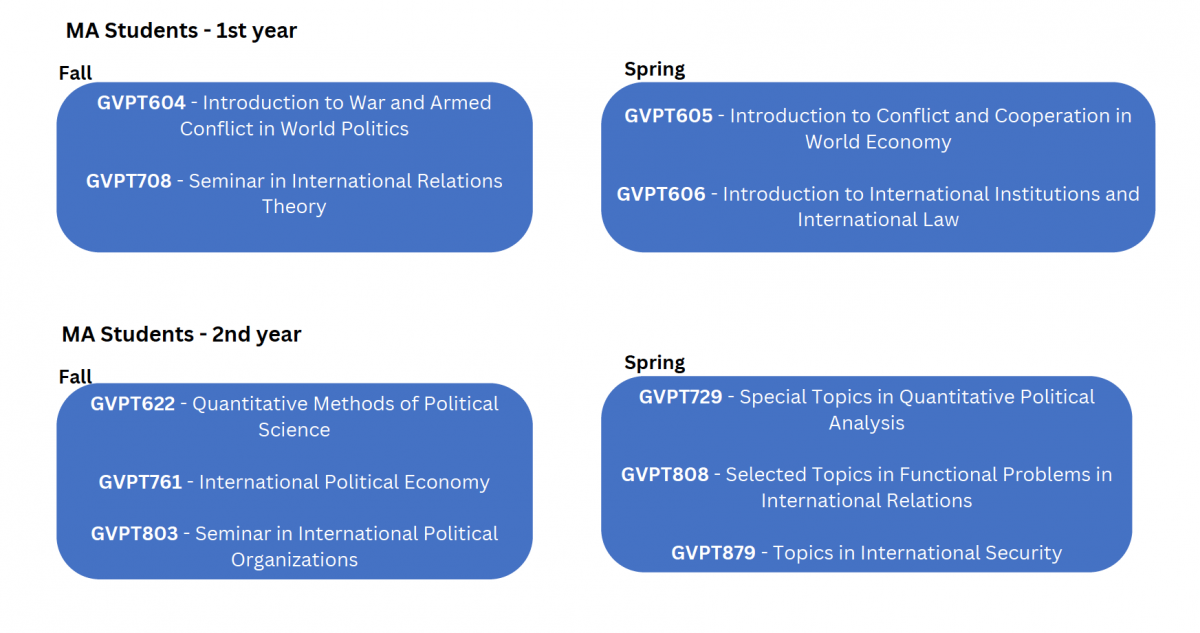Home | Program Information | Application | Faculty & Staff | FAQs | Upcoming Events | Contact Us | MAIR Journal
Master of Arts in International Relations (MAIR) Program Information
The Master of Arts in International Relations (MAIR) is designed to provide advanced coursework and applied quantitative methods training for students seeking international careers as analysts in public and private sectors as well as researchers in academia and think tanks. By combining the fundamental skills learned in the first year of the program with the analytical skills that are the focus of the Master's program, graduates of the MAIR program will be ideally suited for a wide variety of careers in academia, government, journalism, law, non-governmental organizations, and international business. The MAIR curriculum of 30 credits includes coursework in international political economy, international security, international law, and statistical methods of data analysis for international relations research questions. The curriculum emphasizes developing research and analysis skills based on a solid background in international relations theory and quantitative empirical research.
The reason for developing quantitative research skills is that across all professional fields in the public and private sectors, there is a growing recognition by employers that their workforce needs to have the skill set to read, evaluate, and analyze quantitative data and information in a sophisticated manner. Employees with such skill sets are, therefore, in greater demand and should have more successful careers.
The MAIR program is administered both to college graduates as a standalone master’s and to existing UMD undergraduates as a combined 4+1 pair of degrees (BA plus MA in MAIR).
The MAIR combined program provides undergraduate students in BSOS, SPH, and JOUR an opportunity to earn a Bachelor's and Master's degree in five academic years. Students admitted to the MAIR 4+1 program will complete a minimum of 141 credits, of which 111 will be earned at the undergraduate level and 30 will be at the graduate level. Nine graduate credits (three courses) will be taken during students' senior year of undergraduate studies. The remaining 21 credits (seven courses) will be taken in the year following completion of the Bachelor's degree. Students in their junior year of a major in BSOS, SPH, and JOUR can apply to the MAIR program and, once admitted, begin coursework in their senior year.BSOS, SPH, and JOUR majors with coursework in international relations, some quantitative methods, and a 3.0 or higher GPA will be most competitive for admission to the MAIR 4+1 program. For example, those BSOS, SPH, and JOUR majors that will complete the IR concentration or the Minor in International Development and Conflict Management should be very competitive for admission to the MAIR 4+1 program. Once enrolled in the MAIR 4+1 program, students who complete their BA degree will then be formally admitted to the Graduate School at UMD, provided they meet all prevailing Graduate School admission requirements.
Below, find the three-course path plans for full-time MA track students.
Below, find the course path for 4+1 track students.
Program Coursework and Capstone
The ten courses that make up the MAIR are offered in a specific sequence, as mentioned above, and therefore the courses must be taken in the order when offered each term. Students in the MAIR program must maintain a 3.0 GPA and also earn a minimum of a B- in each of their MAIR courses.
GVPT 604: Introduction to War and Armed Conflict in World Politics
Abstract: This seminar examines major theories of both international and civil wars and reviews major empirical studies that test theories of conflict. The topics include the onset of armed conflict, the duration and outcomes of wars, and the durability of peace in the aftermath of wars. The focus is on developing an understanding of central debates in the literature and primary empirical findings from quantitative and cross-national analyses.
GVPT 605: Introduction to Conflict and Cooperation in the World Economy
Abstract: This seminar examines major theoretical approaches and empirical studies of international political economy, contemporary dynamics of globalization, the role of domestic politics in the formation of foreign economic policies of states, the dynamics of international trade and investment disputes, and the role of international institutions in multi-lateral governance of the world economy. The focus is on developing an understanding of central debates in the literature and primary empirical findings from quantitative and cross-national analyses.
GVPT 606: Introduction to International Institutions and International Law
Abstract: This seminar examines major theoretical approaches and empirical studies of international law and institutions relating to international political economy and international security. Topics to be covered include the sources of international law and the development of core legal principles in the post-WWII era, the role of international economic institutions such as WTO, IMF, and World Bank in the global economy, and the influence of international institutions such as the UN Security Council, World Court, and International Criminal Court in addressing international security issues. Larger questions about the effectiveness of the WTO, Laws of War, and International Human Rights Law will be considered. The focus is on developing an understanding of central debates in the literature and primary empirical findings from quantitative and cross-national analyses.
GVPT 708: Seminar in International Relations Theory
Abstract: This course will focus on central theoretical and analytical approaches to understanding how domestic and international factors influence and shape both the foreign policy goals pursued by national leaders and how these same factors affect the ability of national leaders to achieve their foreign policy goals. Theoretical approaches to studying international political economy,
international security and international law and institutions will be emphasized.
GVPT 761: International Political Economy
Abstract: This course examines central theoretical and empirical studies of international trade, finance, and investment, as well as topics such as MNC relations with host countries, the relationship of domestic politics to foreign economic policy, patterns of globalization, and key legal principles relating to IPE. Throughout the course, emphasis will be given to the importance of political and strategic factors in shaping and influencing international economics.
GVPT 803: Seminar in International Political Organizations
Abstract: This seminar examines some of the most important international economic institutions in the global economy, such as the International Monetary Fund, the World Bank, the World Trade Organization, and regional development and investment banks. In addition, key security institutions such as the UN Security Council, regional security organizations, and the International Criminal Court will be examined. Key issues regarding political influences on behavior and effectiveness of international institutions are considered as well as challenges facing each organization, including possible major reforms.
GVPT 622: Quantitative Methods of Political Science
Abstract: This course will focus on statistical methods of data analysis that are commonly used in the study of international relations. Regression analysis of observational data will be given primary attention as well as problems of causal inference with observational data and how to address them. The course will conclude with a discussion of recent work in IR using experimental designs and data analysis.
GVPT 729: Special Topics in Quantitative Political Analysis
Abstract: This seminar will examine major data sets that are widely used in the study of international political economy and international security and cutting-edge quantitative analyses utilizing these data sets. Attention will be given to the strengths and weakness of these data sets and quantitative studies and their utility in addressing central topics in the study of international political economy and international security.
GVPT 808: Selected Topics in Functional Problems in International Relations
This seminar focuses on the intersection of economic and military power in international relations and explores how the academic literature applies to the concerns of both traditional great powers and the developing countries. This course lies at the intersection of security and economy and explores the implications of their profound linkage. Specifically, this course examines 1) the impact of increased interdependence on the incentives to use force and the impact of doing so, 2) the ways in which states pursue their security objectives through economic instruments, 3) the economic determinants of protests, coups, and civil wars, and 4) the relevance of theoretical and policy implications of the scholarly works to the developing world.
GVPT 879: Capstone
Capstone
All students must complete a capstone paper that will incorporate a theoretical framework, datasets to be used, measurement of variables, and appropriate statistical methods. The capstone paper will be completed in the final semester of coursework.
Students who earn a B- or above in all ten of these graduate courses and maintain an overall GPA of 3.0 or higher in their graduate coursework will receive a Master of Arts in International Relations.
Career Prospects
Completion of the MAIR coursework and methods training is intended to support students with career goals centered in research and analysis, be that in a conventional academic career as a faculty member at a university or a professional career path requiring sophisticated applied research and analysis of international relations issues. For those with academic career goals, the MAIR program should enhance their prospects of admission to top Ph.D. programs in the social sciences in the US and abroad by providing advanced coursework and methods training that would strengthen their academic record and better prepare them for Ph.D. studies. For students with professional goals to pursue careers in government agencies, private firms, non-governmental organizations, and international institutions, the MAIR program would provide the advanced coursework and training to engage in quantitative analyses of policy-relevant international relations issues and to ground that analysis in relevant international relations literatures from academic research. The MAIR program will work with offices on campus to support job placement or applications to Ph.D. programs depending on the career goals of students completing the program.
Tuition Costs
For the MAIR combined 4+1 program, the cost of tuition for the three courses (nine credits) in the student’s senior year of study will be at the student’s usual undergraduate tuition rate. A major financial advantage to this program for the combined 4+1 program is that these nine credits in the senior year will be counted towards both their Bachelor’s degree as well as their Master’s degree. Information about the cost per credit and fees for MAIR can be found on the program's website at Extended Studies.
Contact Information
For more information or if you have any questions, please email MAIR [at] umd.edu.






